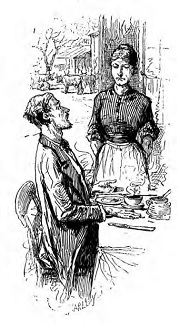WHY WORRY?
BY: GEORGE LINCOLN WALTON, M.D.
CONSULTING NEUROLOGIST TO THE MASSACHUSETTS GENERAL HOSPITAL
XIII.
THE WORRIER AT THE TABLE
These little things are great to little man.
--GOLDSMITH: The Traveller
 The insistent habit of mind is nowhere more noticeable than in connection with the food. The insistent habit of mind is nowhere more noticeable than in connection with the food.
I have seen a hotel habitué, apparently sane, who invariably cut, or broke, his bread into minute particles, and minutely inspected each before placing it in his mouth. If this were a book of confessions, I should have myself to plead guilty, among worse things, to having avoided mince pie for weeks after encountering among other ingredients of this delicacy, a piece of broken glass.
 Not infrequently the obsessive diner so long hesitates before giving his
final order that the waiter brings the wrong dish. The insistent thought now replaces the doubting folly, and the diner would as soon think of
eating grass as the article offered. I have known him impatiently to leave the table under these circumstances, and to play the ostentatious martyr,
rather than partake of the food he had at the outset given weighty consideration. I have seen another omit his lunch because water had been
spilled upon the cloth, and still another left the dining-car, with the announcement that he would forego his meal because informed by the
conductor that men's shirt waists without coats were taboo.
Not infrequently the obsessive diner so long hesitates before giving his
final order that the waiter brings the wrong dish. The insistent thought now replaces the doubting folly, and the diner would as soon think of
eating grass as the article offered. I have known him impatiently to leave the table under these circumstances, and to play the ostentatious martyr,
rather than partake of the food he had at the outset given weighty consideration. I have seen another omit his lunch because water had been
spilled upon the cloth, and still another left the dining-car, with the announcement that he would forego his meal because informed by the
conductor that men's shirt waists without coats were taboo.
The obsessive of this type may by training even reach the point of seeing
the amusing instead of the pathetic side of the picture when in the course
of his travels, his request for "a nice bit of chicken, cut thin," is
transmitted to the kitchen as--"One chick."
One day, with pride, I called the attention of my easy-going friend to the
fact that I was eating a dish I had not ordered. He quietly remarked that
the next step was to eat it and say nothing!
Another friend has this motto in his dining room: "Eat what is set before you and be thankful." His
children will open their eyes when they find others, less reasonably
reared, demanding that the potatoes be changed because they were sprinkled
with parsley, that a plate be replaced because it has had a piece of cheese
upon it, or that the salad of lettuce and tomato be removed in favor of one with tomato alone.
A lady recently told me of breakfasting with a foreign sojourner in
America, who upon being offered the contents of an egg broken into a glass,
was not satisfied with declining it, but felt impelled to express his
extreme disgust at this method of serving it, fortunately to the amusement, rather than to the annoyance of his hostess.
"After this, know likewise," says Epictetus, "that you are a brother too; and that to this character it belongs to make concessions, to be easily persuaded, to use gentle language, never to claim for yourself any non-essential thing, but cheerfully to give up these to be repaid by a larger share of things essential. Consider what it is, instead of lettuce, for instance, or a chair, to procure for yourself a good temper. How great an advantage gained!"
The insistent desire to have a certain degree and character of appetite does not infrequently lead to consulting the physician. Still more common is the
obsession that the appetite must be gratified, the supposition being that the desire for food is, in the growing child or in the adult, an infallible
guide to the amount needed, though it is a matter of common knowledge that this is not true of infants or of domestic animals. If one leaves the table
hungry he soon forgets it unless inordinately self-centered, and he has no more desire to return than to go back to bed and finish the nap so
reluctantly discontinued in the morning.
WEBMASTER NOTE: Studies have shown that the "appetite" is a poor forecaster of the amount of food needed by the body for health and function. What is perceived as "hunger" is often thirst, and, having eaten "enough" most people will not be aware of the feeling of satisfaction until about 20 minutes after the meal!
I have heard the theory advanced by an anxious forecaster of future ills,
that all unnecessary food, if packed away as adipose tissue, serves to
nourish the body in periods of starvation. Assuming that the average
individual needs to consider this stress of circumstance, I am strongly of the impression that the best preparation for enforced abstinence will prove,
not a layer of fat, but the habit of abstinence. The nursery poet says:
"The worry cow would have lived till now
If she'd only saved her breath.
She feared the hay wouldn't last all day
So choked herself to death."
The quantity of food proved by experiments to suffice for the best work, physical or mental, is surprisingly small. A feeling of emptiness, even, is better preparation for active exercise than one of satiety.
It is a national obsession with us that no meal is complete without meat.
Order fruit, cereal, rolls, and coffee, at the hotel some morning, and the
chances are ten to one that the waiter will ask what you are going to have
for breakfast, though you have already ordered more than is absolutely
necessary for that meal, as demonstrated by the custom upon the Continent,
where the sense of fitness is as much violated by the consumption of an
enormous breakfast as it is with us by the omission of a single detail.
It may be asked if it is not subversive of discipline for the hotel
habitué to become too easy-going. There is doubtless a limit to the
virtue of allowing ourselves to be imposed upon, but there is little fear
that the individual who opens the question will err in this direction. It
behooves him rather to consider the danger of his occupying the unenviable
position of the "fuss-budget."
Next Page: The Fear of Becoming Insane
Previous Page: The Worrier on His Travels
Preface
OTHER STRESS RELATED ARTICLES:
Return to NoDiet4Me.com
Why Worry - The Worrier at the Table
Stress - Eating
Web Page Copyright 2023 by Donovan Baldwin
Page Updated 7:00 PM Monday, December 18, 2023
|